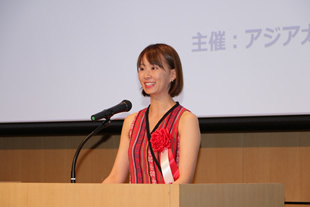 The 23rd Asia Pacific Research Prize - Commendation winner: Dr. Pattajit Tangsinmunkong
The 23rd Asia Pacific Research Prize - Commendation winner: Dr. Pattajit Tangsinmunkong
Title of Dissertation: “Uprooting the Bamboo: Thai Diplomatic History Revisited”

- Dr. Pattajit Tangsinmunkong
-
- Career -
Pattajit Tangsinmunkong is an Assistant Professor at the Institute for Advanced Studies on Asia (IASA) at the University of Tokyo. Born in Chiang Mai, Thailand, she earned a B.A. in Chinese from the Faculty of Arts at Chulalongkorn University. She then served as Secretary to the Ambassador at the Royal Thai Embassy in Beijing. Pattajit received her master’s degree in 2016 and her Ph.D. in 2019 from the Graduate School of Social Sciences at Waseda University. She joined the University of Tokyo in 2022. Trained as a historian, she focuses on the modern history of Southeast, with particular interest in comparative historical narratives, diplomatic discourse, and international perceptions.
- Summary -
The purpose of this dissertation is to critically examine the concept of “Bamboo Diplomacy” (Thai: Pai-Lu-Lom), a mainstream idea in traditional Thai diplomatic discourse, and to introduce a new historical perspective. The term "bamboo diplomacy" is frequently used to describe Thailand’s diplomatic success. It suggests that, under the leadership of astute monarchs and political figures, Thailand adapted flexibly to the prevailing influences of major powers such as China, Britain, France, Japan, and the United States, much like bamboo bending with the wind. Consequently, Thailand remains the only country in Southeast Asia never colonized by foreign powers, maintaining its independence to this day. This discourse is still widely used to promote Thai exceptionalism and nationalism by highlighting the wisdom of its leadership, national uniqueness, and the continuity of its diplomatic tradition.This dissertation positions "Bamboo Diplomacy" as a subject of critique. It explores the complex relationships between foreign policies and the perceptions of Thai leaders, media, intellectuals, and the general public amidst dramatic changes in international and domestic politics from the 1960s to 2020s. Utilizing diplomatic documents, essay collections, media, and previous studies in Thai, Japanese, English, and Chinese, this work reveals Thai diplomatic history as a series of conflicts, miscalculations, and shifting stances rather than a coherent narrative. By reintroducing the conflicts faced by various actors, their responses, and the logic behind their choices into the narrative of diplomatic history, the book offers a new perspective that takes its readers beyond traditional Thai diplomatic history.
This dissertation comprises seven chapters. The introductory chapter outlines the general framework and issues of the “Bamboo Diplomacy” discourse, presenting key questions and an analytical framework. Chapter 1 provides a historical overview and introduces the concept of the “small state mentality.” Chapters 2 through 5 analyze the relationship between actual foreign policy, various actors’ political thoughts on diplomacy, and external influences from the 1960s to 2020. The final chapter discusses the relationship between the discourse on bamboo diplomacy, the small state mentality, international perceptions, and nationalism.






